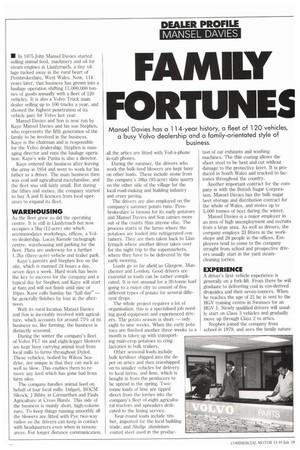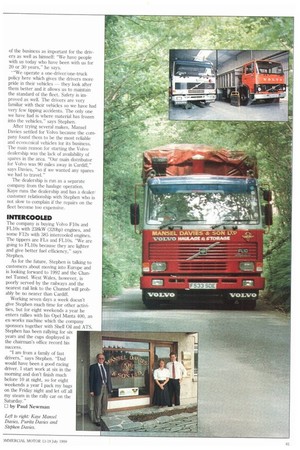FAMILY FORTUNES
Page 62

Page 63

If you've noticed an error in this article please click here to report it so we can fix it.
Mansel Davies has a 114-year history, a fleet of 120 vehicles, a busy Volvo dealership and a family-orientated style of business.
MI In 1875 John Manse! Davies started selling animal feed, machinery and oil for steam engines in Llanfymach, a tiny village tucked away in the rural heart of Pembrokeshire, West Wales. Now, 114 years later, that business has grown into a haulage operation shifting 11,000,000 tonnes of goods annually with a fleet of 120 vehicles. It is also a Volvo Truck main dealer selling up to 100 trucks a year, and showed the highest penetration of its vehicle parc for Volvo last year.
Manse! Davies and Son is now run by Kaye Mansel Davies and his son Stephen, who represents the fifth generation of the family to be involved in the business. Kaye is the chairman and is responsible for the Volvo dealership; Stephen is managing director and runs the haulage operation. Kaye's wife Purita is also a director.
Kaye entered the business after leaving the army in 1954 and went to work for his father as a driver. The main business then was coal and agricultural merchandise, and the fleet was still fairly small. But during the fifties and sixties, the company started to buy A and B licences from local operators to expand its fleet.
WAREHOUSING
As the fleet grew so did the operating centre. It is still in Llarifymach but now occupies a 5ha (12-acre) site which accommodates workshops, offices, a Volvo dealership, Lucas Kienzle tachograph centre, warehousing and parking for the fleet. Plans are underway for a further 1.2ha (three-acre) vehicle and trailer park.
Kaye's parents and Stephen live on the site, which is manned 24 hours a day, seven days a week. Hard work has been the key to success for the company and a typical day for Stephen and Kaye will start at 6am and will not finish until nine or lOpm. Kaye calls Sunday his "half day'' — he generally finishes by four in the afternoon.
With its rural location Mansel Davies and Son is inevitably involved with agriculture, which accounts for around 75% of its business so, like farming, the business is distinctly seasonal.
During the winter the company's fleet of Volvo FL7 six and eight-legger blowers are kept busy carrying animal feed from local mills to farms throughout Dyfed. These vehicles, bodied by Wilcox Seadyke, are unique in that they can suck as well as blow. This enables them to remove any feed which has gone bad from farm silos.
The company handles animal feed on behalf of four local mills: Dalgeti, BOCM Silcock, J Bibby in Carmarthen and Pauls Agriculture at Cross Hands. This side of the business is mainly short, high-volume runs. To keep things running smoothly all the blowers are fitted with Pye two-way radios so the drivers can keep in contact with headquarters even when in remote areas. For longer distance communication, all the artics are fitted with Vod-a-phone in-cab phones.
During the summer, the drivers who work the bulk-feed blowers are kept busy on other loads. These include stone from the company's 38ha (93-acre) slate quarry on the other side of the village for the local road-making and building industry and crazy paving.
The drivers are also employed on the company's summer potato runs. Pembrokeshire is famous for its early potatoes and Manse! Davies and Son carries more out of the county than anyone else. The process starts at the farms where the potatoes are loaded into refrigerated containers. They are then taken back to Llanfymach where another driver takes over for the night trip to the supermarkets, where they have to be delivered by the early morning.
Loads go as far afield as Glasgow, Manchester and London. Good drivers are essential as loads can be rather complicated. It is not unusual for a 20-tonne load going to a major city to consist of five different types of potato for several different drops.
The whole project requires a lot of organisation; this is a specialised job needing good equipment and experienced drivers. The potato season is short — only eight to nine weeks. When the early potatoes are finished another three weeks to a month is taken up with transporting main-crop potatoes to crisp factories in bulk trailers.
Other seasonal loads include bulk fertiliser shipped into the depot on artics and then transhipped on to smaller vehicles for delivery to local farms, and lime, which is bought in from the producers to be spread in the spring. Twotonne loads of lime are tipped direct from the lorries into the company's fleet of eight agricultural tractors and spreaders dedicated to the liming service.
Year-round loads include timber, imported for the local building trade, and Aludip: aluminiumcoated steel used in the produc tion of car exhausts and washing machines. The thin coating allows the sheet steel to be bent and cut without damage to the protective layer. It is produced in South Wales and trucked to factories throughout the country.
Another important contract for the company is with the British Sugar Corporation. Manse] Davies has the bulk sugar beet storage and distribution contract for the whole of Wales, and stores up to 5,000 tonnes of beet during the winter.
Mansel Davies is a major employer in an area of high unemployment and recruits from a large area. As well as drivers, the company employs 33 fitters in the workshops and 28 people in the offices. Employees tend to come to the company straight from school and prospective drivers usually start in the yard steamcleaning lorries.
EXPERIENCE
A driver's first vehicle experience is generally on a fork-lift. From there he will graduate to delivering coal in van-derived dropsides and then seven-tonners. When he reaches the age of 21 he is sent to the HGV training centre in Swansea for an HGV 1. Newly qualified drivers will usually start on Class 3 vehicles and gradually move up through Class 2 to artics.
Stephen joined the company from school in 1979, and sees the family nature of the business as important for the drivers as well as himself: "We have people with us today who have been with us for 20 or 30 years," he says.
-"We operate a one-driver/one-truck policy here which gives the drivers more pride in their vehicles — they look after them better and it allows us to maintain the standard of the fleet. Safety is improved as well. The drivers are very familiar with their vehicles so we have had very few tipping accidents. The only one we have had is where material has frozen into the vehicles," says Stephen.
After trying several makes, Mansel Davies settled for Volvo because the company found them to be the most reliable and economical vehicles tor its business. The main reason for starting the Volvo dealership was the lack of availability of spares in the area. "Our main distributor for Volvo was 90 miles away in Cardiff," says Davies, "so if we wanted any spares we had to travel."
The dealership is run as a separate company from the haulage operation. Kaye runs the dealership and has a dealer/ customer relationship with Stephen who is not slow to complain if the repairs on the fleet become too expensive.
IMIRCOOLED
The company is buying Volvo FlOs and FLIOs with 238kW (320hp) engines, and some F 12s with 385 intercooled engines. The tippers are FLs and FLIOs. "We are going to FLIOs because they are lighter and give better fuel efficiency," says Stephen.
As for the future, Stephen is talking to customers about moving into Europe and is looking forward to 1992 and the Channel Tunnel. West Wales, however, is poorly served by the railways and the nearest rail link to the Chunnel will probably be no nearer than Cardiff.
Working seven days a week doesn't give Stephen much time for other activities, but for eight weekends a year he enters rallies with his Opel Manta 400, an ex-works machine which the company sponsors together with Shell Oil and ATS. Stephen has been rallying for six years and the cups displayed in the chairman's office record his success.
"I am from a family of fast drivers," says Stephen. "Dad would have been a good racing driver. I start work at six in the morning and don't finish much before 10 at night, so for eight weekends a year I pack my bags on the Friday night and let off all my steam in the rally car on the Saturday."
0 by Paul Newman 1410 right: Kaye Manse! Davies, Purita Davies and Stephen Davies.








































































































































